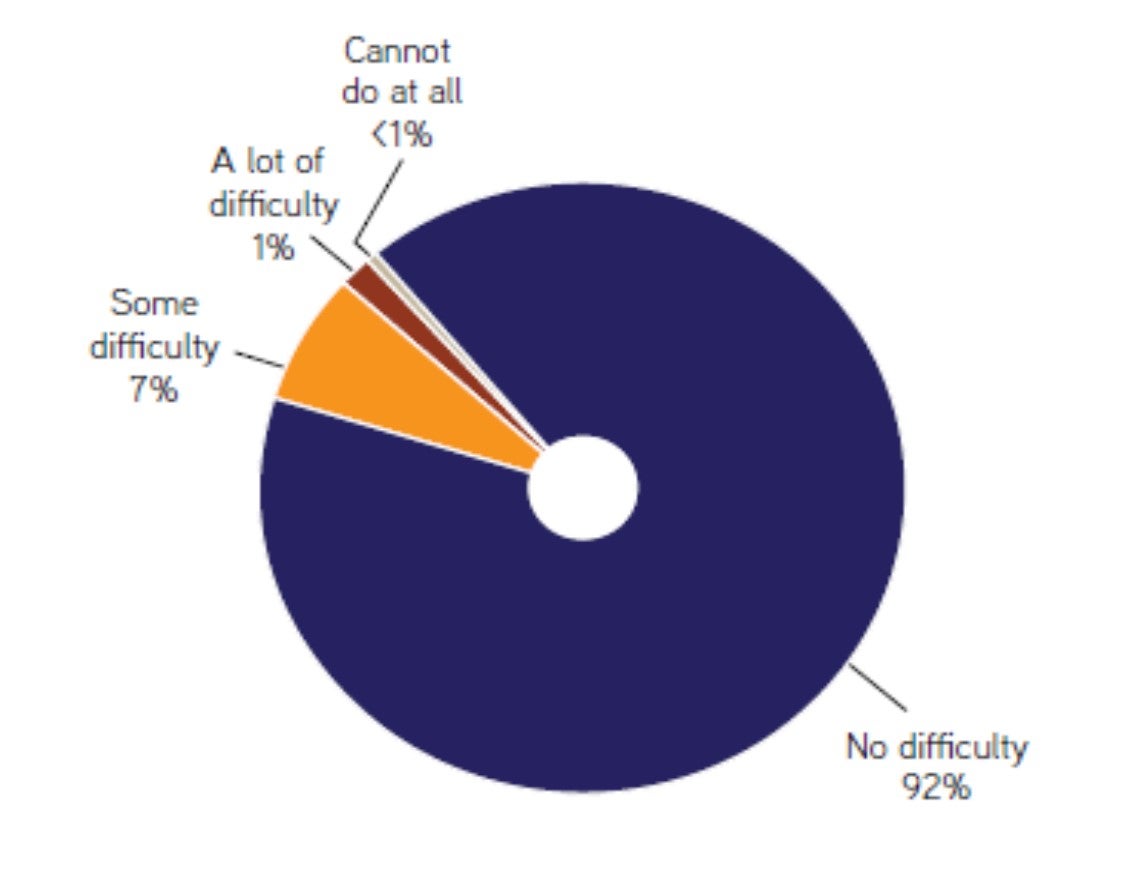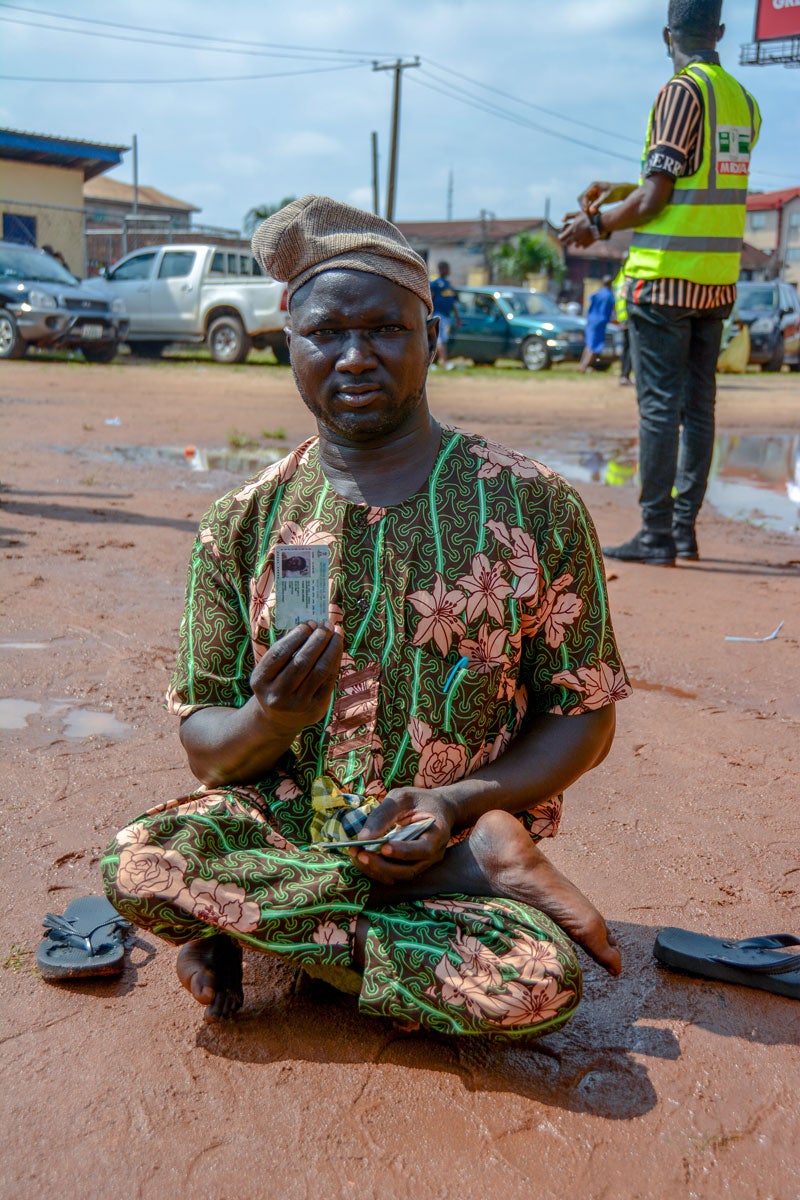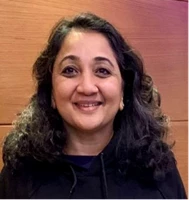 A physically challenged man holds up his voter's card during the Edo Governorship election, in Benin City, Nigeria, on September 19, 2020.
A physically challenged man holds up his voter's card during the Edo Governorship election, in Benin City, Nigeria, on September 19, 2020.
Persons with disabilities are more likely to experience extreme poverty in Nigeria than those without a disability. While there is not a clear estimation of the number of people with disabilities in Nigeria, data from the 2018 Nigeria Demographic and Health Survey revealed that an estimated 7% of household members above the age of five (as well as 9%t of those 60 or older) experience some level of difficulty in at least one functional domain—seeing, hearing, communication, cognition, walking, or self-care. Similarly, 1%either have a lot of difficulty or cannot function at all in at least one domain (figure 1).
Figure 1. Prevalence of Functional Difficulties in Nigeria in at Least One Domain

Source: NPC and IFC 2019: 458 based on Demographic and Health Survey data: Nigeria
DHS-VII (NDHS) 2018
The government of Nigeria, both at the state and federal level, has taken some steps to address the needs of persons with disabilities. One significant step came in January 2019 with the ratification of the Discrimination Against Persons with Disabilities (Prohibition) Act 2018, though implementation is yet to materialize. In addition, nine states in the Federation have enacted disability laws to safeguard the rights of persons with disabilities to varying degrees of implementation.
Persons with disabilities in Nigeria persistently face stigma, discrimination, and barriers to accessing basic social services and economic opportunities. Today, they face greater barriers brought about by the impacts of the COVID-19 pandemic. The Nigeria Rapid Assessment on Disability Inclusion identified a number of these salient barriers.
For one, persons with disabilities may experience negative attitudes at family and community levels, including name-calling, negative beliefs, and misconceptions surrounding the causes of disabilities (usually associated with religious or cultural norms, and beliefs). As one woman with a physical disability in Jos puts it – “Some people say the reason why I am visually impaired is because I committed a sin.” These negative attitudes manifest in rejection, neglect, loss of respect, denial of identity or self-worth, and often result in low self-esteem, depression and isolation. This, along with structural limitations and challenges, also reinforces barriers for persons with disabilities in accessing basic services such as education, health, public transport, and social safety nets.
Persons with disabilities face difficulties accessing adequate health services, often being limited by the availability of accessible hospitals and personnel who are aware of and specialized in disability inclusion and providing services for persons with disabilities. They also experience poor educational outcomes on account of the absence of adequate facilities, including accessible infrastructure; learning materials; and teachers trained in inclusive education. A man with albinism from Abuja elaborates on the challenge faced – “First there is the educational barrier… [persons with disabilities] don’t have access to quality education. Many parents cannot even afford getting them admitted [to the school] and then as to continuing education, the system itself is not inclusive enough to cater to their needs.”
Unemployment rates among persons with disabilities are almost double that of the general population, owing to attitudinal, mobility-related, technological, and physical barriers (lack of accessible workplaces). Assistive devices are expensive and not easily available, which limits the mobility and access to technology for persons with disabilities. In addition, many will experience frequent denial of job opportunities, employers’ negatives attitudes, inappropriate job placement, lower expectations at work, and a lack of reasonable accommodation.
These challenges among others compound the vulnerability of persons with disabilities, and especially during COVID-19. A distinct absence of data pertaining to disability prevalence and the different forms of disabilities persists in Nigeria, which in turn challenges effective policy responses and data driven programming.
It is important that government officials, policymakers, and decision makers are aware of the importance of disability as a development issue and enhance data collection on disability. A concerted effort to raise awareness surrounding disability issues would serve to shift negative perceptions and stigma against persons with disabilities among families and communities.
In order to forge a disability-inclusive recovery from COVID-19, support for existing disability inclusion legislation in Nigeria is imperative. This means promoting the implementation of the Discrimination Against Persons with Disabilities (Prohibition) Act 2018 and strengthening the institutional landscape for disability inclusion through the Disability Commission. A woman with a physical disability from Abuja captures the issue well – “Persons with disabilities should not relax and think ‘we now have a law, everything you need will fall into place.’ No, we must continue to work, to advocate for implementation.”
In spite of the lack of implementation surrounding the 2018 Act, the government has made progress elsewhere. The 2018 Nigeria Demographic and Health Survey included a disability module based on the Washington Group on Disability Statistics Short-Set of Disability Questions. This, in turn, is aligned with the World Bank’s 10 Commitments on Disability Inclusion, with Commitment 3 focusing on data collection related to disability.
Furthermore, investments in inclusive employment and livelihood interventions are critical to addressing unemployment challenges among persons with disabilities. These could include entrepreneurship training and business advisory services, as well as the promotion of locally produced assistive devices and accessible workplaces. Disability-focused organizations in Nigeria should be empowered to support this process and provide services to persons with disabilities and caregivers.
Persons with disabilities are more likely to experience adverse socioeconomic outcomes and face higher rates of multidimensional poverty than the general population. President Muhammadu Buhari’s goal of lifting 100 million Nigerians out of poverty by 2029, in addition to achieving inclusive economic growth, will be challenging without the inclusion of persons with disabilities.




Join the Conversation